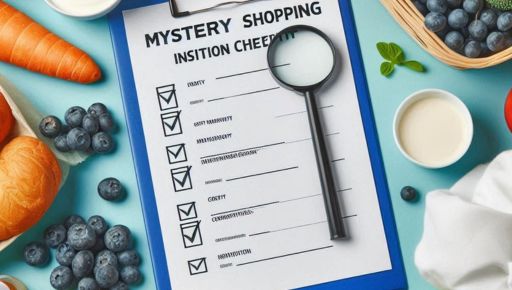
Imagine stepping into a grocery store not just as a regular shopper but with a mission, armed with an inspection checklist. It’s all part of the undercover world of grocery mystery shopping! These mystery shopping gigs help stores improve their customer experience and uphold standards, while offering shoppers a bit of fun (and sometimes even some perks).
Mystery shopping involves posing as a regular customer and evaluating different aspects of the shopping experience. From the freshness of produce to the friendliness of the staff, mystery shoppers provide feedback based on specific criteria. Here are six engaging examples of what grocery mystery shoppers look for when they conduct inspections.
1. First Impressions of the Store
The first thing on most mystery shopping inspection checklists? The entrance. How clean and inviting does the store appear from the outside? Mystery shoppers look for neatness, good lighting, and, most importantly, clear signage. For example, if a shopper walks in and finds a display of fresh flowers or a fruit stand at the entrance, it creates a welcoming vibe. A cluttered or dirty entryway, on the other hand, gives an impression that the store isn’t well-kept, which could turn potential customers away.
2. Cleanliness and Organization of Aisles
Navigating clean, well-organized aisles enhances the shopping experience and reflects the store’s commitment to customer satisfaction. Mystery shoppers observe the overall tidiness, checking if items are stocked neatly, with nothing blocking the aisles. This involves inspecting areas like the meat, dairy, and frozen food sections, where cleanliness is particularly important. If shoppers find spills, misplaced items, or clutter, it reflects poorly on the store’s organization and upkeep.
3. Freshness and Quality of Produce
Mystery shoppers are trained to assess the freshness and quality of produce. They examine the fruits and vegetables for ripeness and signs of wilting or bruising. For instance, they might test a bunch of bananas to ensure they’re fresh and free of blemishes or look at apples to see if they’re firm, not mushy. Shoppers report on whether the produce appears fresh and vibrant, as low-quality produce can suggest that the store isn’t maintaining good supply practices.
4. Availability and Accessibility of Products
Nothing’s more frustrating than searching for a specific product and finding an empty shelf! Mystery shoppers evaluate how well-stocked the shelves are and if products are accessible to everyone, including the elderly or those in wheelchairs. They also check if popular or essential items are out of stock. For instance, if a shopper can’t find milk or bread on the shelves, that’s a big red flag. Mystery shoppers also consider whether store signage and labels make it easy to find items.
5. Staff Friendliness and Customer Service
One of the most critical aspects of grocery shopping is how customers are treated by the staff. Mystery shoppers take note of whether staff members are approachable, helpful, and polite. They may interact with staff to ask questions or seek assistance, gauging how willing the employees are to help. Good customer service makes people feel valued and can turn a simple grocery run into a pleasant experience. If staff members seem unfriendly or uninterested, it’s a sign the store needs improvement in customer relations.
6. Checkout Experience
Finally, mystery shopping services providers pay close attention to the checkout process. How long does it take? Are the cashiers polite and efficient? Mystery shoppers observe whether there are enough cashiers to keep lines moving, especially during busy times. They also check if cashiers handle transactions smoothly and with a friendly demeanor. A slow or chaotic checkout can leave customers with a negative impression, so it’s an essential part of the evaluation.
Wrapping Up
Grocery mystery shopping adds a layer of intrigue to a regular shopping experience, with a mission to ensure every customer has a pleasant time. Whether it’s about cleanliness, the quality of produce, or the friendliness of staff, mystery shoppers’ checklists reveal details that can make or break a store’s reputation. So, the next time you walk down those aisles, know that someone might be quietly evaluating the store to help create a better shopping experience for all!
